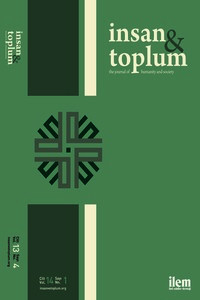Rethinking the Debate on Universalism Versus Cultural Relativism Regarding Human Rights: The Case of China
Abstract
This study aims to address the debate on universalism versus relativism regarding human rights over the case of China. By the end of the Cold War and with the increasing effects of globalization dynamics, the idea of human rights had become a controversial issue, and interventions in states that violate human rights have come to the agenda of international society. United States of America and the European Union have frequently mentioned the issue of human rights violations with regard to China. However, China has emphasized that no one should intervene with it on this issue, claiming up until the 1990s in the face of these allegations that the issue was its own internal affair. Meanwhile, China has tried to open a discussion about the universality of human rights through cultural values. China focuses on Asian values, claiming that human rights are a product of the Eurocentric Western modern world. This situation can be considered a challenge of postmodern and post-colonial theories that highlight cultural relativism, regarding the mainstream theories represented by realism and liberalism within the discipline of International Relations. However, using these critical theories may reproduce existing power relations by reducing them into a cultural context. This study seeks to reexamine China’s human rights understanding beyond the universalism vs. relativism debate.
References
- Acharya, A. (2017). After liberal hegemony: The advent of a multiplex world order, Ethics & International Affairs, 31(3), 271–285.
- Acharya, A. (2020). The myth of the “civilization state”: Rising powers and the cultural challenge to world order. Ethics & International Affairs, 34(2), 139–156.
- Angle, S., & Svensson, M. (2001). The Chinese human rights reader: Documents and commentary 1900–2000. M. E. Sharpe.
- Angle, S. C. (2002). Human rights and Chinese thought: A cross-cultural inquiry. Cambridge University Press.
İnsan Hakları Konusunda Evrenselciliğe Karşı Kültürel Görecelik Tartışmasını Yeniden Düşünmek: Çin Örneği
Abstract
Bu çalışma, insan haklarına ilişkin evrenselcilik ve görecelilik tartışmasını Çin örneğinde ele almayı amaçlamaktadır. Soğuk Savaş’ın sona ermesi ve küreselleşme dinamiklerinin artan etkisiyle insan hakları fikri tartışmalı bir konu haline gelmiştir. İnsan haklarını ihlal eden devletlere müdahale edilmesi konusu uluslararası toplumun önemli gündemlerinden biri olmuştur. Çin örneğinde olduğu gibi insan hakları ihlali konusu Amerika Birleşik Devletleri ve Avrupa Birliği tarafından da sıklıkla dile getirilmektedir. Çin ise 1990’lı yıllara kadar bu iddialara karşı konunun kendi içişleri olduğunu öne sürerek bu konuya müdahale edilmemesi gerektiğini vurgulamıştır. Ancak Çin, insan haklarının evrenselliğini kültürel değerlerle tartışmaya açmaya çalışmıştır. Çin, insan haklarının Avrupa merkezli ve Batılı - modern dünyanın ürünü olduğunu iddia ederek Asya değerlerini vurgulamıştır. Bu durum, Uluslararası İlişkiler disiplini içinde realizm ve liberalizmin temsil ettiği ana akım teorilere karşı, kültürel göreciliği ön plana çıkaran postmodern ve post-kolonyal teorilerin meydan okuması olarak değerlendirilebilir. Ancak, bu eleştirel teorileri kullanmak, mevcut iktidar ilişkilerini kültürel bağlama indirgeyerek yeniden üretebilmektedir. Bu çalışma, Çin›in insan hakları anlayışını evrensellik/görecelilik tartışmasının ötesinde yeniden düşünmeyi amaçlamaktadır.
References
- Acharya, A. (2017). After liberal hegemony: The advent of a multiplex world order, Ethics & International Affairs, 31(3), 271–285.
- Acharya, A. (2020). The myth of the “civilization state”: Rising powers and the cultural challenge to world order. Ethics & International Affairs, 34(2), 139–156.
- Angle, S., & Svensson, M. (2001). The Chinese human rights reader: Documents and commentary 1900–2000. M. E. Sharpe.
- Angle, S. C. (2002). Human rights and Chinese thought: A cross-cultural inquiry. Cambridge University Press.
Details
| Primary Language | English |
|---|---|
| Subjects | International Relations (Other) |
| Journal Section | Research Articles |
| Authors | |
| Publication Date | March 8, 2024 |
| Published in Issue | Year 2024 Volume: 14 Issue: 1 |


